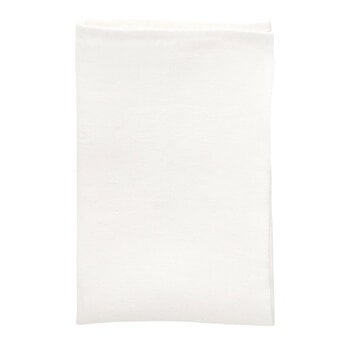The Usva napkin by Lapuan Kankurit is made of washed European linen, a carefree material with a naturally laid-back appearance that is ideal for rustic modern table settings. It is not necessary to iron the linen napkin – small wrinkles and creases give it a relaxed, natural look. However, if you prefer a neater style, you can iron the napkin with linen adjustments. Characteristic of undyed linen, the napkin gets lighter and softer with each wash.
The linen napkin is decorated with a classic, minimalist stripe pattern designed by Anu Leinonen. Thanks to its handy size, machine-washable material and lightweight feel, the Usva napkin is very versatile: in addition to table settings, it also serves as a face towel in the bathroom or on trips. The linen napkin is woven at the Lapuan Kankurit weaving mill in Finland.








